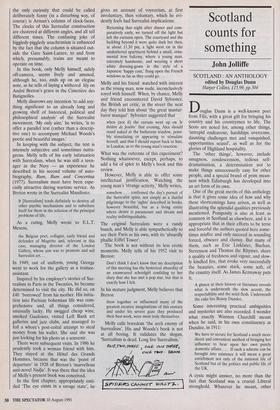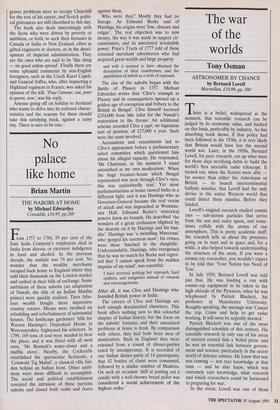Scotland counts for something
John Jolliffe
SCOTLAND : AN ANTHOLOGY
edited by Douglas Dunn Harper Collins, £15.99, pp.304 Douglas Dunn is a well-known poet from Fife, with a great gift for bringing his country and his countrymen to life. The Scots are noted for, among other things, `intrepid endeavour, hardships overcome, daunting challenges met and vanquished, opportunities seized', as well as for the glories of Highland hospitality.
The 'other things', however, include smugness, condescension, tedious self- dramatisation, a determination not to make things unnecessarily easy for other people, and a special brand of prim mean- ness which Edinburgh has developed into an art form of its own.
One of the great merits of this anthology is that it gives some idea of how and why these shortcomings have arisen, as well as illustrating the splendid qualities previously mentioned. Pomposity is also at least as common in Scotland as elsewhere, and it is appropriate that in their efforts to be terse and forceful the authors quoted here some- times misfire and only succeed in sounding forced, obscure and clumsy. But many of them, such as Eric Linklater, Buchan, Stevenson and Thomas the Rhymer, share a quality of freshness and vigour, and slow- ly kindled fire, that evoke very successfully the beauties, some stark, some soft, of the country itself. As James Kennaway puts it,
A glance at their history or literature reveals what is underneath the slow accent, the respectability and the solid flesh. Underneath the cake lies Bonny Dundee.
Some interesting practical ambiguities and mysteries are also recorded. I wonder what exactly Winston Churchill meant when he said, in his own constituency at Dundee, in 1911:
We have to secure for Scotland a much more direct and convenient method of bringing her influence to bear upon her own purely domestic affairs ... If such a scheme can be brought into existence it will mean a great enrichment not only of the national life of Scotland but of the politics and public life of the UK.
A cynic might answer, no more than the fact that Scotland was a crucial Liberal stronghold. Whatever he meant, other
graver problems were to occupy Churchill for the rest of his career, and Scotch politi- cal grievances are still cherished to this day.
The book also deals interestingly with the Scots who were driven by poverty or ambition, or both, to seek their fortunes in Canada or India or New Zealand, often as gifted engineers or doctors, or in the devel- opment of imperial administration. They are the ones who are said to be 'like dung — no good unless spread'. Finally there are some splendid comments by non-English foreigners, such as the Czech Karel Capek, and General Joffre, who, after inspecting a Highland regiment in France, was asked his opinion of the kilt. 'Pour ?amour, oui, pour la guerre, non, was his reply.
Anyone going off on holiday to Scotland who wants to delve into its national charac- teristics and the reasons for them should take this satisfying book, against a rainy day. There is sure to be one.



















































 Previous page
Previous page